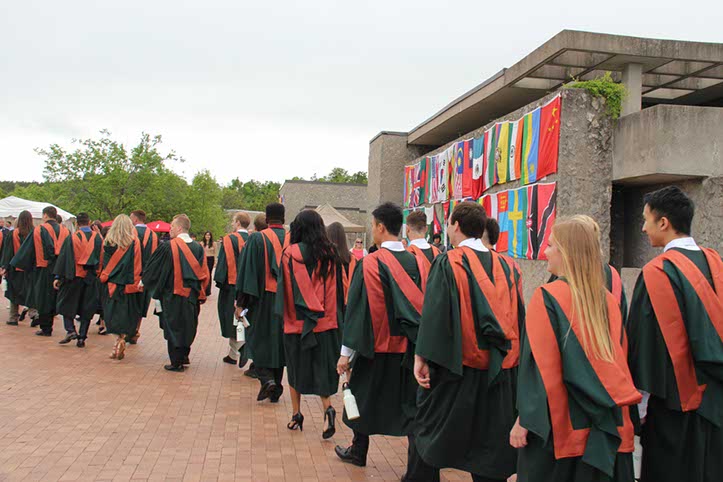Speech by Don Tapscott
To the 2013 graduating classes of
Business Administration and Nursing
On the Occasion of his Installation as
Chancellor of Trent University
Mr. President, graduates, friends and family:
Heartfelt congratulations to each of you graduating today and to those who share your success.
I am deeply honoured to have been chosen as the 11th Chancellor of Trent University and I’m humbled knowing what large shoes of former Chancellors I have to fill. I’ve also been looking forward to my installation today with great anticipation.
The word “Installation” is an interesting one, causing me to reflect on what else we “install.” Air conditioners? Sinks? Light fixtures? Carburetors? The main thing that get’s installed in my world is software. So think of me as the Trent 11th Chancellor App. Today is my official booting up. You don’t even need to read the installation manual because I’m now fully downloaded and ready to run. If I begin to slow down you should feel free to demand a reboot or to recompile me. I’m hoping to serve you well and that I won’t need an upgrade. But you never know – You may want a new version of me – let’s call it Chancellor 2.0. (Well those of you who studied computer science may have found that funnier than the rest of you..)
In seriousness, Trent has always been a very special place for me. As you know Trent distinguishes itself through its focus on collaborative learning, where students not only receive information but work together to create and test new concepts.
I came to Trent because I wanted a personalized and interactive learning experience and even back then Trent seemed to provide that. And it was a good choice. At Trent I wasn’t just a passive recipient of knowledge but rather a co-creator of my own intellectual capacity.
You may not know it, but the Trent model of collaborative learning is in stark contrast to the models of the past. The industrial age was an age of standardization and scale – where something at the top pushed down standard units to passive recipients. Mass production. Mass media. Mass marketing. Mass education. Manufacturers, or journalists, or TV producers or teachers pushed out standardized products, publications, shows or lectures to audiences that were inert.
When it came to the university, learning was focused on the educator. The approach was the one-way lecture, one-size fits all, and students were isolated in the learning process.
This is all changing. The Trent model is important because today’s young students have grown up immersed in interactive media and communicating, rather being inert and isolated viewers of television like their boomer parents. As a result, they learn better through interaction and collaboration than being passive recipients.
Collaboration is important not just because it’s a better way to learn. The spirit of collaboration is penetrating every institution and all of our lives. So learning to collaborate is part of equipping yourself for effectiveness, problem solving, innovation and life-long learning in an ever-changing networked economy.
The digital revolution has distributed knowledge and enabled new models of working and learning together. We’re entering a new age of participation, where collaboration is spreading across the world like a prairie fire and teams are critical to almost everything. Rather than superiors and subordinates, peers can now come together to do almost everything — sometimes on an astronomical scale. Thousands of volunteers have collaborated in creating Linux, the world’s important
computer operating system. Hundreds of thousands of amateur astronomers are mapping the heavens as part of Galaxy Zoo. Millions of people have worked together to create Wikipedia, an encyclopedia that is in 240 languages and (according the biggest study) has the same error rate as Britannica. Hundreds of millions of people have joined Facebook Causes, each looking for ways to work with others to build a better world.
This is so important for the different faculties in the audience today.
Those of you graduating in Business Administration will be successful through collaborative approaches rather than traditional command-and-control hierarchies. Proctor and Gamble now gets 60 percent of its innovations by finding the uniquely qualified minds for discovery outside the walls the company. Companies turn their customers into producers or “prosumers” like Threadless – a clothing company where the customers design the clothes. The Chinese motorcycle industry is made of dozens of small companies who work together – with no overall motorcycle company pulling the strings. This is now 40 percent of the world’s motorcycle production.
Some of you will be entrepreneurs or join small companies and collaboration opens a world of new possibilities for you. Small companies can now have all the capabilities of large companies without all the liabilities – legacy cultures, systems and processes. Because of the Internet, talent can now be outside a company’s boundaries and customers inside. More and more society will create wealth through networks of collaborators rather than industrial age behemoths (a word I learned by the way studying sociology at Trent.)
This is so important, among other reasons is that 90 percent of new jobs in Canada come from companies 5 years old or less. If we’re ever to overcome the so-called “jobless recovery” entrepreneurship and collaboration will be the key.
In addition to getting their great innovations from networking with talent outside their boundaries, big companies benefit from entrepreneurship too, as many are acquiring brilliant small companies with great innovations rather than relying solely on their research and development departments. As the new saying goes M&A is the new R&D.
If you’re graduating in nursing, your working life will be one of collaboration, as nursing has changed from being an occupation to a full profession in its own right and healthcare itself is being transformed. Nurses are now truly at the heart of patient care. As nurses you will be working in interdisciplinary, collaborative teams that involve doctors, social workers, research clinicians, therapists, educators, administrators and the patients themselves. These teams design and execute a complete wellness program for a patient in the context of their whole life.
Collaborating with patients is something new. The industrial model of healthcare — as with media, production, education and everything else — clinicians delivered care to passive recipients. (“I’m a clinician. I have knowledge. You’re a patient you don’t. I deliver healthcare to you.”) I remember after I graduated from Trent, asking our family doctor a question during a diagnosis. He answered to me that he was the doctor and he would do the questioning. How things have changed since then!
Today patients are informed like never before. Moms are checking their kid’s symptoms on the Mayo Clinic’s web site. Millions of people with various disorders are learning from each other in platforms such as PatientsLikeMe.com. As an example, 20 percent of all North Americans with Lou Gehrig’s disease (ALS) are learning from each other’s experience there. And clinicians and medical researchers are huge beneficiaries.
In fact health research is changing too. The pharmaceutical companies this year are losing a quarter of their revenue due to something called the patent cliff – where many blockbuster drugs are losing their patent protection. They have no choice but to reinvent their industry, by sharing clinical trial data. Imagine how sharing medical research data in a commons could do to transform not just the industry but lead to breakthroughs in human health.
Collaboration will affect all of you in another way – as citizens. Trent describes itself as the champion of collaborative learning that is personal, purposeful and transformative.
Many of you came to Trent because you care and want to make a difference, not just in your profession but in the world. And this is a time of great transformation. My hope is that you will not only be effective professionals but agents for change in these troubled times.
I’m sure it’s no revelation to you that our society has many problems. Youth unemployment everywhere is high. Many of the institutions of the industrial age that have served us well for decades, from old models of the corporation, media, government, the financial services industry, science, seem paralyzed and unable to move forward. Leaders of institutions everywhere have lost trust. The global economy is stalled and the world is deeply divided, too unequal, unstable and unsustainable.
Your generation will need to turn this situation around – find new solutions for our connected world — and each of you will have a role to play. You will need to participate in change in your workplace, community, country and in causes you join and as a global citizen. And you will need to teach your children well.
I believe that you are uniquely equipped to lead this change. As you enter the workforce and society, you will have at your fingertips the best tools for innovation, patient care, research and learning ever. And your Trent experience will serve you well.
As citizens I hope you will demand more transparent government and that politicians engage with you more than simply asking for your vote. I’m hopeful that you’ll bring about a whole new era of democracy. The first wave of democracy established elected and accountable institutions of governance, but with a weak public mandate and an inert citizenry. You can bring in a second wave, characterized by strong representation and a new culture of public deliberation built on active citizenship.
I’m not suggesting that each of you become a candidate for Prime Minister or world leader. Change will happen in every home, community, business, hospital, clinic, organization and every nook and cranny of society. It’s an opportunity for each of you if you will it.
Wherever you are, design your life. Live the values of your generation. Continue your university experience with a full life that is purposeful, transformational and consequential.
Like you I’m embarking on a new role. You’re becoming alumni and I’m becoming a Chancellor. I’m excited about intensifying my collaboration with Trent – but only if you, the faculty, students, and alumni want me to.
My generation has not done the best job ensuring that the world you are inheriting is a better one. Your time has come. With you rest the hopes of the world. Carry this mantle well.
(And hey, if you want to collaborate with me I’m @dtapscott on twitter. Or friend me on Facebook.)






